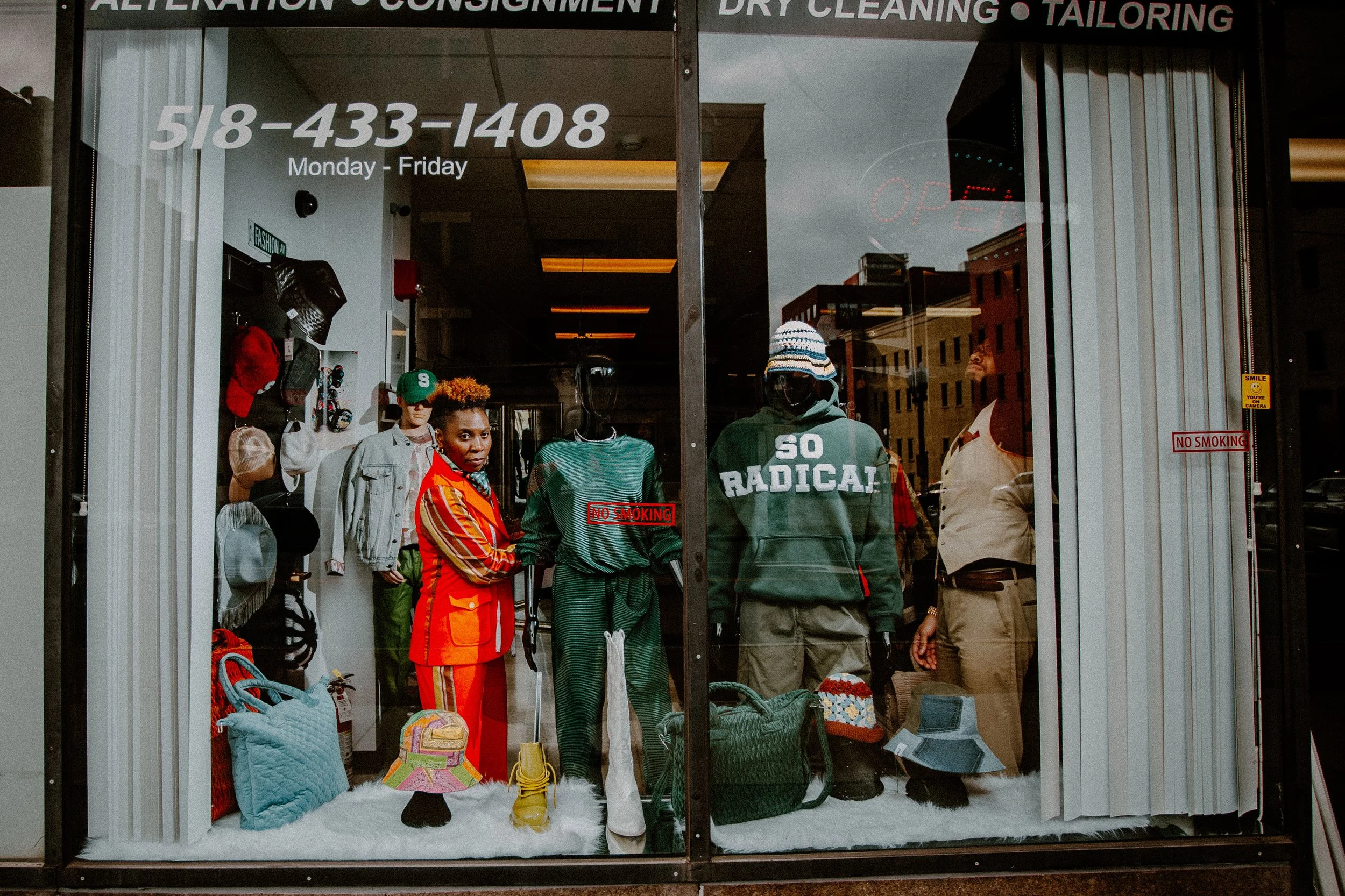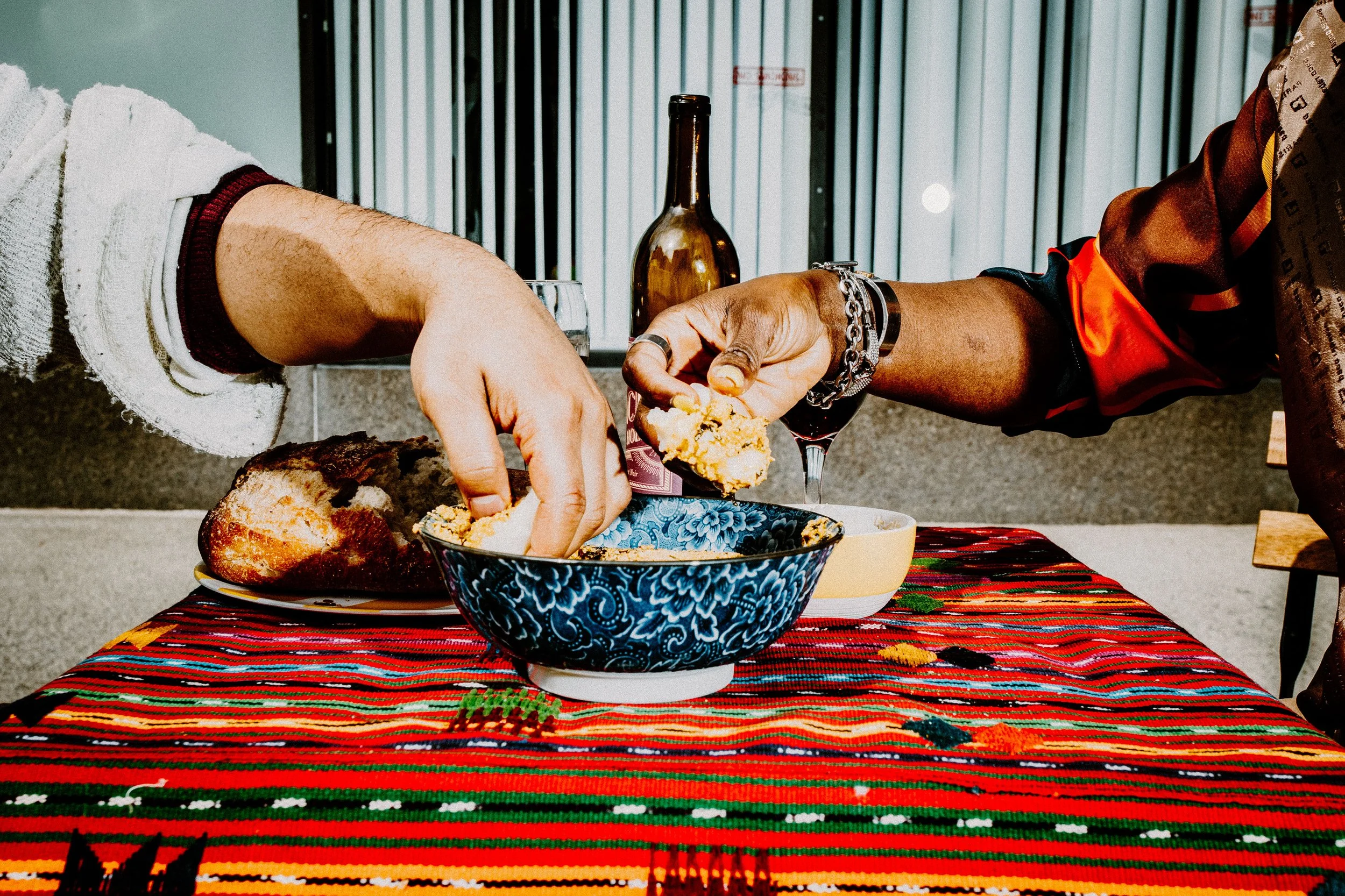MEET: Mo Rabiu, So Radical
Fashion designer Mo Rabiu talks DJing, fufu + Fashion Week.
Interview: Susie Davidson Powell
Art Direction: Susie Davidson Powell
Photography: Konrad Odhiambo/The Dishing
Production Assistants/Models: Mel T. Meus, Jermaine Wright, Diyana Faith
Shoot location: Downtown Albany | Interview location: Pearl Street Diner
Talking with Nigerian fashion designer Mo Rabiu, owner of European Tailoring in downtown Albany, and the visionary behind sustainable street fashion brand, So Radical.
MO RABIU, Designer, So’ Radical Clothing – Made for Dope Humans | IG: @eutailoring | IG: @soradicalnewyork
Mo Rabiu, owner of European Tailoring & Alterations in downtown Albany, NY, is the fashion designer-visionary behind So Radical Clothing, which has already had a stellar 2024-2025 season with Paris-fashion week, New York fashion week, an upstate 518 fashion show with the Shred foundation, and a new collection ready for London Fashion Week this fall. Mo made time for an epic downtown shoot on the streets of Albany before our interview. Mo, you’re one busy person. Let's get into it.
SDP: What's on your calendar this week? Any plans?
MR: This week, I’m just pretty much just working at the shop. I have some prom and graduations coming up and wedding season is starting, so I get busy this time of the year.
SDP: Mo, you left a career in finance to pursue fashion but grew up in Nigeria, learning about fabric from your mother, a textile designer, who was taught by a Swiss fabric maker and sold her vibrant designs in a Nigerian marketplace. Your family moved to London and New York City, where you learned tailoring skills from a wedding dressmaker and worked as a sales associate in Ralph Loren. Can you connect the dots of how you came full circle to launch So Radical?
MR: I have to say first of all, I have faith. While I was in Nigeria I used to dread going to my mom’s store because I saw it every day, all around me, but I loved the feel of textiles, touching them and the intricate design that goes into a fabric. But then we migrated to England when I was about 14 and I didn't even think about it after a while. We lived in England for about 5, 6 years and then I came to school here in the states. I went to SUNY Plattsburgh and I think I started to gain my sense of style while I was in college in the way I would dress…
I graduated with an accounting degree and then wanted to try something else so I moved to the city and got a job as sales associate with Ralph Lauren, but on the weekends I would also DJ! That's something that a lot of people don't know. I used to house DJ as a gig on the side. I also came across a lady who was a wedding dressmaker in the garment district and I think that's where the correlation came in for me. It was like, “Ding, ding, ding! My mom used to do this! I would just go over and learn how to cut and sew for about two years, no pay, nothing. But I loved it.
I lived in the city until I was about 22 then I came back upstate and got a job in finance finally using my degree. I did that for 11 years. When I moved back upstate, I was also styling people on the side – clients from military people coming back to the workforce and ordinary working people. I was busy – I’ve always been hustling that way. Then came 2020 and like a lot of us, I was tired of what I was doing. But the push was when I asked for a raise and wasn't getting it because of the pandemic. At the same time, the alterations studio became available – I was told by a friend – so I said, yeah, let me try it, still thinking if it doesn't work I’ll just have to go back to work. I took it, started cleaning the place, getting it ready, even though there was no one at work. So, that's why I said faith. I did that and I never looked back. I started with alterations and then came the birth of So Radical, which is just now a two year old brand, but its name recognition came so fast that I've been able to do Paris Fashion Week, New York Fashion Week, and even within the area I've done a couple of shows since I just like put myself out there. See, that's the story, that's the genesis.
SDP: What are some of your food memories and how do they resonate with who you are or what you do today?
MR: Okay. I'm from Nigeria, so a lot of my food memories are just like back home. It's become popular culture now so a lot more people know what is called fufu – swallow food. Even so, the way I grew up eating it is still different from what is here now. So needless to say one of my favorite food growing up is pounded yam and in West Africa what we call egusi (a soup made from ground melon seeds – Ed.) I tell you what, throughout the week I can eat whatever, but on the weekends - ‘cause I have time - I tend to go to swallow food. I eat fufu and a lot of my traditional foods like beans… it's just something that I really enjoy doing; it's very therapeutic because cooking fufu takes a while. Sunday is my cook day. My favorite soup to make is egusi followed by okra, or any cultural foods, stews. I like anything that has to do with stew. Keobi on Lark Street has egusi and fufu.
SDP: As a fashion designer and a curator of style, where do you draw your inspiration from?
MR: You will find this very interesting: I draw inspiration from music. I had an interview once and they asked me, “How do you design?” because I don't know how to draw it. I don't sketch. At all.
SDP: So how do you bring your designs to life?
MR: Imagination. From listening to music. So, I draw inspiration from music and some of my favorite designers as well. But when it comes to me creating for So Radical, it's usually what I'm listening to, how I'm feeling at the time, that's how I work, which is kind of weird. Like, I do not sketch my work.
SDP: Let me ask you about music. What are you listening to currently either at home or at work?
MR: At home, I tend to listen to jazz, a lot of jazz, a lot of jazz orchestra like Boney James. At work, it's different because I tend to listen to chill EDMs. I don't like to listen to slow music at work. I play a lot of house music…
SDP: The pandemic exposed the costs and fragility of food supply chains, but we've seen a similar reckoning in the fashion industry over fast fashion and the environmental costs of disposable textiles. Your fashion company, So Radical, focuses on upcycling textiles and fashion for your unique designs. How did that come about and why is it important to you?
MR: That's a very good question. I care a lot about the environment…There's just so much pollution when it comes to fashion. I was watching a documentary in India where (I think it was H&M) the dye that goes into the rivers kills the fish and the people who live within the area can’t get food, farmers can't grow anything, big corporations are destroying their livelihood. I told myself if I'm gonna do fashion then I'm gonna have to do it the right way.
That's where also being a tailor helps – I have a lot of remnants of fabric that I'm not just gonna throw away because it ends up in a landfill… I love fashion, but I'm gonna do it in a more sustainable way and that is why I decided to go into upcycling and handmade garments from scratch. It's not just upcycling; I source my fabric where I also go to fashion houses and get their fabric remnants. I create from that and I don't mass produce. I've had people ask me how it is scalable. Well, I'm not looking for that. I feel like you can get a good garment that is well curated, well sourced, and you can feel proud about what you wear, if you really care. Every garment has a story and you can tell the story of what you're wearing.
SDP: I love that — storytelling. If someone sees your design on a model at Paris fashion week and wants that outfit, you don’t have different sizes; it’s a unique 1 of 1?
MR: We’ll take that garment and tailor it to them. They’re genderless and I do try to go between sizes when I'm creating, but if someone likes it, I tailor it and it becomes theirs.
SDP: We touched on this... What's your favorite dish and where’s your favorite place to get it?
MR: I have a couple. Like I said, my favorite dish fufu (pounded yam) with egusi or okra stew. I do make it myself and I also have a friend who is a chef here and it was his favorite food growing up so I've been able to teach him to make it. If I don't feel like cooking, I go to Barcelona on Western Avenue. It's Mediterranean, Spanish influenced. That's one of my favorite places to get food around here and it has a simple, chill vibe.
SDP: What's your go-to drink?
MR: I once asked a bartender to make me something with juice and he made me a cranberry vodka – that was my first taste of cranberry, ever! So that's my go to. Tito’s, by the way. I like to go to War Room and The Hollow. Around here, those are my go-tos round here.
SDP: Around the Capital Region, do you have favorite spots for breakfast, lunch and dinner?
MR: For breakfast, I like The Nest in Schenectady. For lunch - because I also love Thai food -I would go to Emanuel's Thai restaurant here in downtown. And for dinner, I would have to go with my favorite restaurant, Barcelona.
SDP: Imagine it's your day off. Reservations are not an issue, and you can get in anywhere - it could be New York City, it could be London. Where would you go?
MR: OK, if I'm taking you, and this is my dream evening - I'm trying to think of the name of the restaurant. It's [pause] Tatiana in New York City with a Nigerian-Caribbean chef, Kwame Omwuachi, but you have to wait like six months to get a reservation. There’s also chef Tayo Elo and for me it’s about the culture because he's from Nigeria and he blends our local Nigerian food with an Italian taste. I follow him on Instagram and I think the way he's able to marry local Nigerian food with Italian flair, that's why I want to try his restaurant. [Chef Timatayo “Tayo” Ola runs Ebi-Ayo, a Nigerian-Italian fusion supper club at Porches Delores in Los Angeles – Ed.)
SDP: I think it’s a supper club. We'll have to put it out to the universe and hopefully get you a reservation. After dinner, would you go out? I mean, you talked about DJing.
MR: Yeah, I do, I do. It’s funny because I go to the city a lot and I tend to stay at Citizen M and they have a rooftop. I love going to rooftops where they play house music, not really a club, but a lounge where you can sit, relax, talk, and get to meet people. That's my kind of night, not to sweat, but just to enjoy, chill, vibe, drink.
SDP: What would be your ideal out of town getaway anywhere?
MR: If it is just a mini break, I love DC. I love the vibe, the food… there's this Turkish restaurant [Zaytinya by José Andrés] that I love to go to whenever I'm in DC. Union Square is my place and it's just the best place to drink, eat food, be a night owl, all in one circle, so I love that. Internationally, I love London. I love to go to all my underground spots… a lot of places in London have that loungey vibe, not too crazy.
SDP: What's your approach to workplace wellbeing or work/life balance? How do you relax?
MR: I tend to relax well. I enjoy massages, so if I'm able to book one, that's my first go-to. I stand a lot, so one of the things for my self-care is that and any moments that I can get with friends. We go out or stay at home, watch movies, nothing too crazy, you know. When you're working a lot of hours you have to achieve that work life balance. I balance my tailoring week that way, and fashion is seasonal so I have busy seasons and slower seasons when I schedule vacations. I’ll have four months where it's just like, go, go, go, go, and then it's like - [pauses] - let's take a break.
SDP: Post-pandemic, people are staying in more, ordering takeout, not dining out as much. What do you see as the future of third spaces for socializing in the community?
MR: I was listening to BBC the other day and they talked about how a lot of clubs are closing since the pandemic and one of the reasons is Gen Z - ages 18 to 25 - are drinking less and it's really eliminating the night life so there's no reason to go dance or all those things we did at night. Lounge bars have become popular – a good playlist and some type of special that brings people in… bars are having game nights and you can play Jenga and meet people hanging out without a cover charge at the door and expensive drinks. I know some restaurants are doing things to get people in for happy hour or some special dish they maybe have on a Wednesday that wouldn't typically be busy. I think that's the future…that’s where I see it going.
SDP: My last question: You've already been to Paris + New York Fashion Weeks, what's next for Mo Rabui + So Radical Clothing?
MR: We have quite a few things in store. We’re having another fashion week – two perhaps, this year. I am hoping to repeat New York Fashion Week, and – you heard it first here – we are going to London Fashion Week for the first time!
SDP: Yes! So I have to come too!
MR: Yeah, you are invited, our special guest. So that's in the works for So Radical and some other local shows that I’ll be doing… I'm about to get very, very busy till November of 2025.
SDP: That's amazing. Thanks so much for talking to me, Mo. I can't wait for us to share news about our upcoming limited edition So Radical x The Dishing merch collaboration!
MR: Yes! Let's do it.





